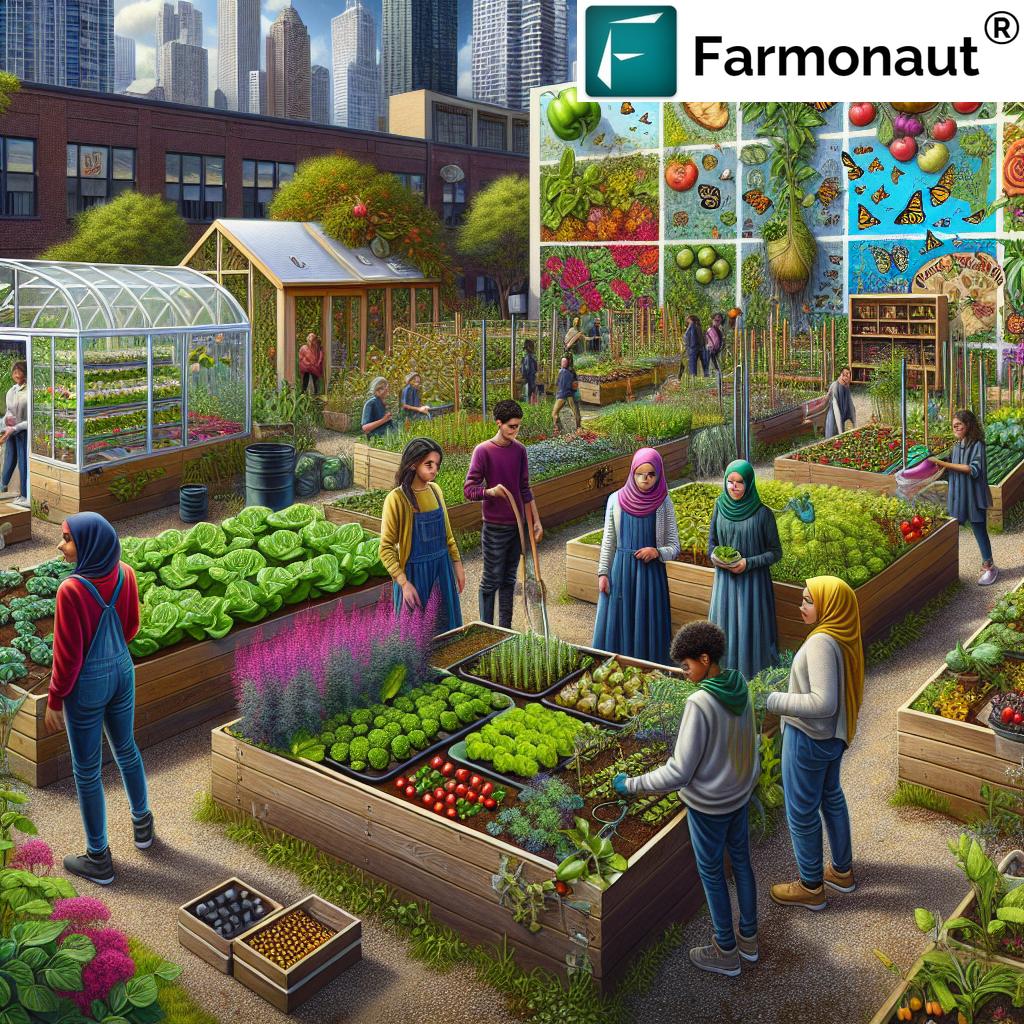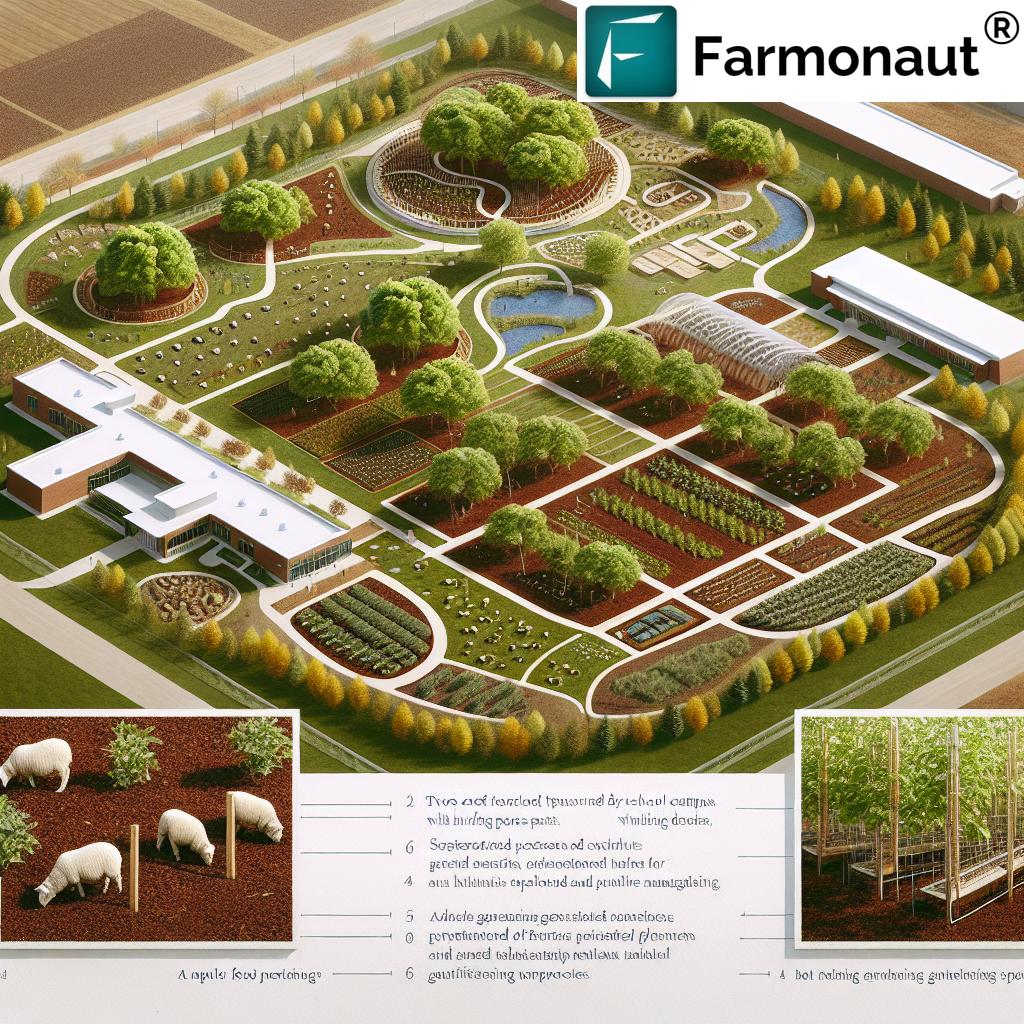Transforming Milwaukee Schools: Urban Agriculture Education Cultivates Sustainable Communities
“Milwaukee’s urban agriculture program features a two-acre food forest with fruit trees and perennial plants as a living laboratory.”
In the heart of Milwaukee, a groundbreaking urban agriculture education program is taking root, transforming not only the landscape of local schools but also the future of sustainable communities. As we delve into this inspiring story, we’ll explore how innovative educators like Joshua Gonzalez are revolutionizing agricultural literacy programs and empowering students to become stewards of their environment.
The Seeds of Change: Joshua Gonzalez’s Vision
At the forefront of this agricultural revolution is Joshua Gonzalez, a second-grade teacher and Agriculture Committee Chairman at River Trail School of Agricultural Science in Milwaukee. His dedication and innovative approach to integrating agricultural literacy into the curriculum have earned him the prestigious 2024 Wisconsin Outstanding Teacher award from Wisconsin Agriculture in the Classroom.
Gonzalez’s journey is deeply rooted in personal experiences that have shaped his vision for urban agriculture education. Growing up in Puerto Rico, he fondly recalls the bountiful harvests from his grandparents’ backyard fruit trees. These memories of community support through shared harvests became the inspiration for his mission to combat food deserts and foster sustainable, healthy communities in Milwaukee.

Cultivating Knowledge: The Power of Agricultural Education
For Gonzalez, agricultural education is more than just teaching about plants and animals. It’s a powerful tool for empowerment, especially for students from economically disadvantaged backgrounds. By integrating sustainable farming practices and food forest design into the curriculum, he’s equipping his students with the knowledge and skills to become self-sufficient urban farmers, enhance their resourcefulness, and adopt healthier lifestyles.
Under Gonzalez’s leadership, River Trail School has become Milwaukee Public Schools’ first specialty agriculture school, serving students from pre-kindergarten through eighth grade. This innovative approach to education is transforming the way students learn about and interact with their environment.
Hands-On Learning: From Classroom to Garden
At River Trail School, agricultural science isn’t confined to textbooks. Students are actively engaged in a variety of hands-on projects that bring sustainable farming practices to life:
- Managing pollinator gardens
- Building and maintaining hydroponics towers
- Caring for chickens
- Running a comprehensive compost program
These practical experiences not only teach students about urban food production but also instill a sense of responsibility and connection to the natural world.
The Food Forest: A Living Laboratory
Perhaps the most ambitious project at River Trail School is the two-acre food forest. This innovative outdoor classroom serves as a living laboratory for sustainable growing systems, featuring:
- A diverse array of fruit trees, including Asian pears
- Nut-bearing trees like chestnuts and hazelnuts
- Perennial plants that mimic natural ecosystems
Gonzalez describes the food forest as a self-sustaining ecosystem that mirrors natural processes. Students learn about sustainable water management in agriculture through the implementation of swales and berms for efficient water runoff control. Plans are underway to introduce sheep and chickens to the food forest, providing natural fertilization and further enhancing the ecosystem.
“Wisconsin teacher’s innovative curriculum integrates cross-curricular agricultural projects, tackling food deserts and promoting sustainable living.”
Cross-Curricular Learning: Bridging Subjects Through Agriculture
One of the most innovative aspects of Gonzalez’s approach is the integration of agricultural themes across various subjects. This cross-curricular approach not only reinforces agricultural literacy but also makes other subjects more engaging and relevant to students’ lives.
A prime example of this integration is the George Washington Carver Peanut Butter Contest. This creative project connects:
- Black History Month
- Agricultural innovation
- Literacy skills
- Scientific principles
By participating in such projects, students develop a holistic understanding of how agriculture intersects with history, culture, and science.

Empowering Through Education: Building Pride and Knowledge
The impact of this innovative agricultural education extends beyond the classroom. Students at River Trail School take pride in harvesting crops and sharing their knowledge with their families. This sense of accomplishment and the ability to contribute to their community’s well-being is a powerful motivator for continued learning and engagement.
To further support this educational journey, we recommend exploring additional resources such as Farmonaut’s web application, which offers advanced satellite-based farm management solutions. These tools can provide valuable insights into crop health monitoring and sustainable farming practices, complementing the hands-on learning experience.
Building a Pathway: From Elementary to Higher Education
Gonzalez’s vision extends beyond elementary education. By collaborating with the district’s agriculture high school, he aims to create a continuous K-12 pathway that inspires students to pursue higher education and career opportunities in agriculture. This long-term perspective ensures that students can build on their early experiences and develop advanced skills as they progress through their education.
For those interested in exploring agricultural technology further, Farmonaut’s API offers access to satellite and weather data that can be integrated into educational projects and research.
Community Impact: Beyond the School Walls
The influence of River Trail School’s agricultural program extends far beyond its campus. By teaching students about sustainable farming practices and food production, the school is addressing critical issues in the community, such as:
- Food deserts
- Nutritional education
- Environmental sustainability
- Community self-sufficiency
These efforts contribute to building a more resilient and health-conscious community, with students acting as ambassadors for sustainable living practices.
Recognition and Support: The Wisconsin Outstanding Teacher Award
Joshua Gonzalez’s dedication to agricultural education has not gone unnoticed. His selection as the 2024 Wisconsin Outstanding Teacher underscores the importance of his work in promoting agricultural literacy and facilitating valuable learning experiences. This award, supported by organizations like the Wisconsin Farm Bureau Foundation and Compeer Financial, recognizes educators who go above and beyond in integrating agriculture into their teaching.
For those looking to bring similar innovative approaches to their classrooms or communities, Farmonaut’s Android app and iOS app offer accessible tools for monitoring crop health and learning about sustainable farming practices.
The Future of Urban Agriculture Education
As we look to the future, the impact of programs like the one at River Trail School is clear. By integrating urban agriculture education into school curricula, we’re not just teaching students about plants and animals; we’re cultivating a new generation of environmentally conscious citizens equipped to tackle the challenges of sustainable living in urban environments.
The success of this program in Milwaukee serves as an inspiration and a model for other urban school districts across the country. It demonstrates how innovative approaches to education can address multiple societal challenges simultaneously, from food security to environmental stewardship.
Urban Agriculture Education: Impact on Students and Communities
| Area of Impact | Traditional Education | Urban Agriculture Education |
|---|---|---|
| Student Engagement | 60% actively engaged | 85% actively engaged |
| Cross-curricular Integration | Limited to 2-3 subjects | Integrated across 5+ subjects |
| Hands-on Learning Opportunities | 10% of classroom time | 40% of classroom time |
| Environmental Awareness | Theoretical knowledge | Practical experience and deep understanding |
| Community Involvement | Annual events (1-2 per year) | Regular engagement (monthly activities) |
| Career Skill Development | General career guidance | Specific agricultural and environmental career pathways |
Embracing Technology in Urban Agriculture Education
As we continue to innovate in urban agriculture education, integrating technology becomes increasingly important. Tools like those offered by Farmonaut can enhance the learning experience by providing real-time data and insights into agricultural processes. These technologies not only supplement hands-on learning but also prepare students for the future of agriculture, where precision farming and data-driven decision-making play crucial roles.
Conclusion: Cultivating a Sustainable Future
The urban agriculture education program in Milwaukee schools, spearheaded by educators like Joshua Gonzalez, is more than just an innovative approach to teaching. It’s a powerful movement that’s transforming education, empowering communities, and paving the way for a more sustainable future.
By integrating agricultural literacy, sustainable farming practices, and hands-on learning experiences into the curriculum, these programs are cultivating a new generation of environmentally conscious citizens. They’re equipping students with the knowledge, skills, and passion needed to address critical issues like food security, environmental sustainability, and community resilience.
As we look to the future, it’s clear that urban agriculture education has the potential to play a pivotal role in shaping sustainable cities and communities. By continuing to support and expand these programs, we can ensure that future generations are prepared to tackle the environmental challenges of tomorrow while building stronger, healthier communities today.
FAQs
- What is urban agriculture education?
Urban agriculture education integrates agricultural literacy and sustainable farming practices into school curricula, teaching students about food production, environmental stewardship, and community sustainability in urban settings. - How does urban agriculture education benefit students?
It provides hands-on learning experiences, enhances cross-curricular understanding, develops practical skills, increases environmental awareness, and fosters community engagement. - What types of projects are included in urban agriculture education?
Projects may include managing pollinator gardens, building hydroponics systems, caring for chickens, composting, and maintaining food forests. - How does urban agriculture education address food deserts?
By teaching students about local food production and sustainable farming practices, it empowers communities to grow their own food and improve access to fresh, healthy produce. - Can urban agriculture education lead to career opportunities?
Yes, it can inspire students to pursue careers in agriculture, environmental science, sustainability, and related fields.
For more information on agricultural education resources, visit WisAgClassroom.org.
















